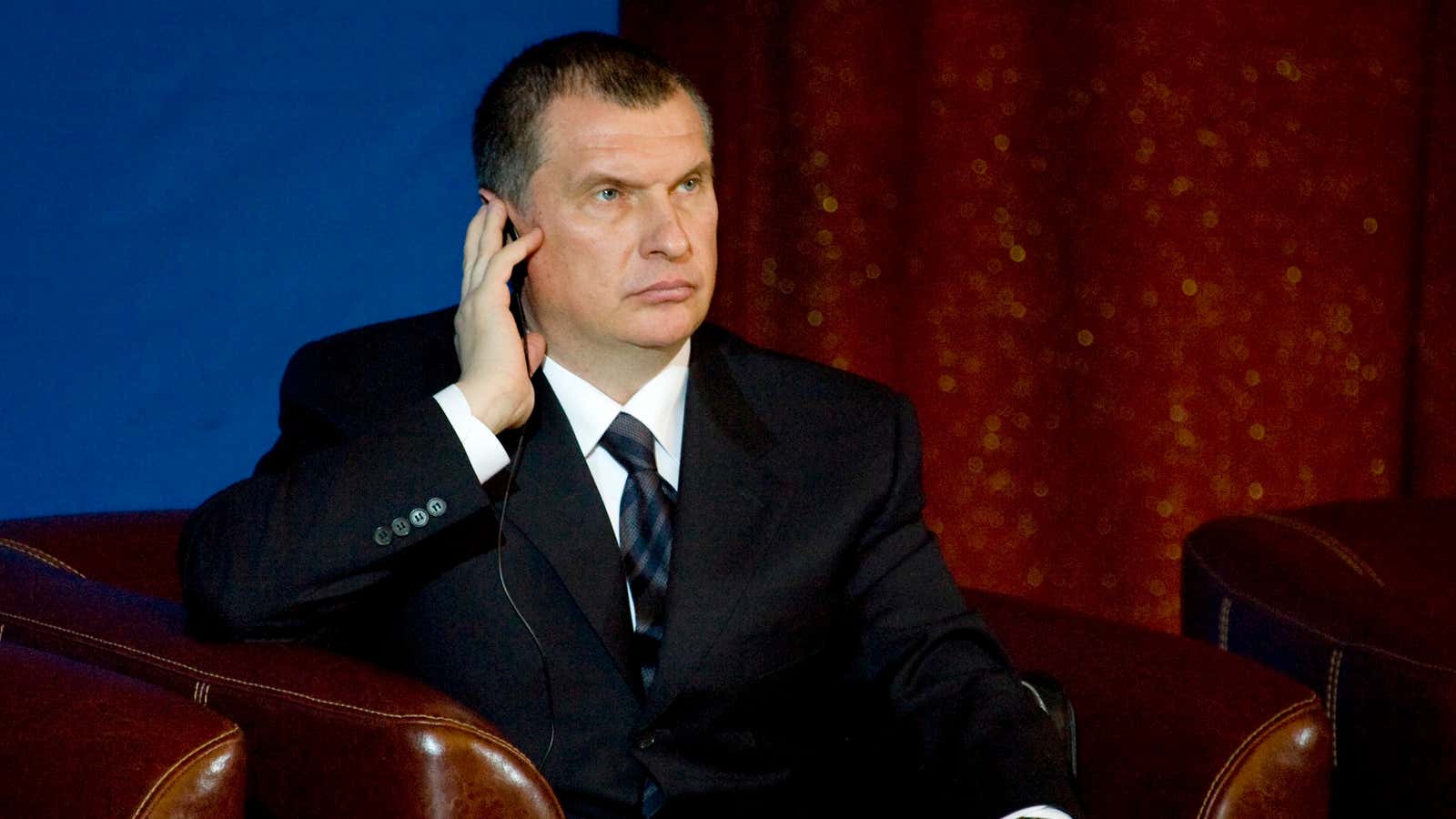Over the last 48 hours, Igor Sechin, the most powerful oilman in Russia, has initialed a $56 billion whirlwind of deals that, if finalized, would create the world’s largest publicly traded oil company—bigger than ExxonMobil, bigger than PetroChina. But while that is heady stuff, there is something else on Sechin’s mind than mere empire building. It is revenge against four Russian oligarchs who humiliated him and left him in the political wilderness last year. For that reason, what we may learn in an official announcement as early as Oct. 18 may be not just of a blockbuster oil deal, but also of the Waterloo of some of Russia’s most successful robber barons of the age.
On Oct. 16 in Moscow, Sechin signed a memorandum of understanding (MOU) in which state-controlled Rosneft would buy 50% of TNK-BP, the nation’s third-largest oil company, from a Russian group called AAR for $28 billion. Just hours later, he flew to London for more negotiations, this time with BP, which owns the other half of TNK-BP, to buy its stake for the same sum in cash and shares. On Oct. 19, BP’s board is to vote (paywall) on the offer.
If both deals proceed, Rosneft will produce some 4.4 million barrels of oil a day, more than any other listed company in the world.
But let’s look at the agreements. The deal between Rosneft and BP, negotiated over the last three or so months, appears to be as sure as any mutually desired accord can be before it is finalized. Expect it go through. Not so much the AAR half. This is because of the identities of AAR’s owners—the four oligarchs who undermined Sechin’s authority in January 2011 by torpedoing a prior blockbuster deal with BP on the Arctic Sea.
At the time, Sechin was known as Russia’s “third man,” the most powerful political figure apart from the president and prime minister. Over the years, he was said to be the key mover behind the breakup of Yukos, Russia’s biggest oil company, whose owner was thrown in prison, and the acquisition of its choicest parts for Rosneft. A journalist dubbed him “Darth Vader” for the dark powers he wielded as both deputy prime minister and chairman of Rosneft. But after AAR successfully sued to stop the January 2011 BP-Rosneft agreement, Sechin lost prestige, and was forced out as deputy prime minister.
Fast forward to today. Over the last year or so, AAR—Len Blavatnik, Mikhail Fridman, German Khan and Viktor Vekselberg—has squeezed BP with the goal of forcing it to sell out its half of TNK-BP at a firesale price of around $10 billion. And the oligarchs, making BP miserable, seemed to be in the driver’s seat—they themselves were impressively powerful forces in numerous Russian businesses. Until June 2012, that is. That’s when BP abruptly announced that, all right, it would sell out. Soon, there was word that Sechin was interested in the share. The oligarchs dismissed it as so much bluff and held out confidence of prevailing.
No longer. Traipsing from bank to bank in London seeking to raise the cash to buy out BP, the oligarchs found that Sechin had already been there tying up the money for his own bid for the British company’s share of TNK-BP. AAR was left strapped and probably unable to bid for the share by the deadline of midnight on Oct. 17. So the oligarchs announced they would sell out their share of TNK-BP as well, leading to the Oct. 16 MOU with Sechin.
There are serious doubts, however, that Rosneft can muster $56 billion in cash to buy the full 100% of TNK-BP. Some of Rosneft’s burden is lifted because BP is prepared to accept a considerable part of the sale price in shares. That commits BP to being a partner with Rosneft, which it wants because this could bring it perches on hydrocarbon reserves across the country, including in the prized Arctic. It could end up still running TNK-BP, only for Rosneft.
But the oligarchs have made it plain that they are not interested in a relationship with Rosneft. They regard the state-controlled company as a lumbering, inefficient dinosaur, one that does not spit out dividends at the rate to which AAR is accustomed. Plus, in such a deal, they would be decidedly junior to Sechin.
Which brings us to the bad blood. In Russia, an MOU is ordinarily regarded as an almost valueless document. Sechin could decide that, even if AAR is eager to compromise, Rosneft actually would like to keep the oligarchs as partners, at least for awhile. “He can have them on hold for a year, and they will be gagging and begging to leave for $10 billion,” said a person familiar with the dealmaking. Then, he would have his revenge.




